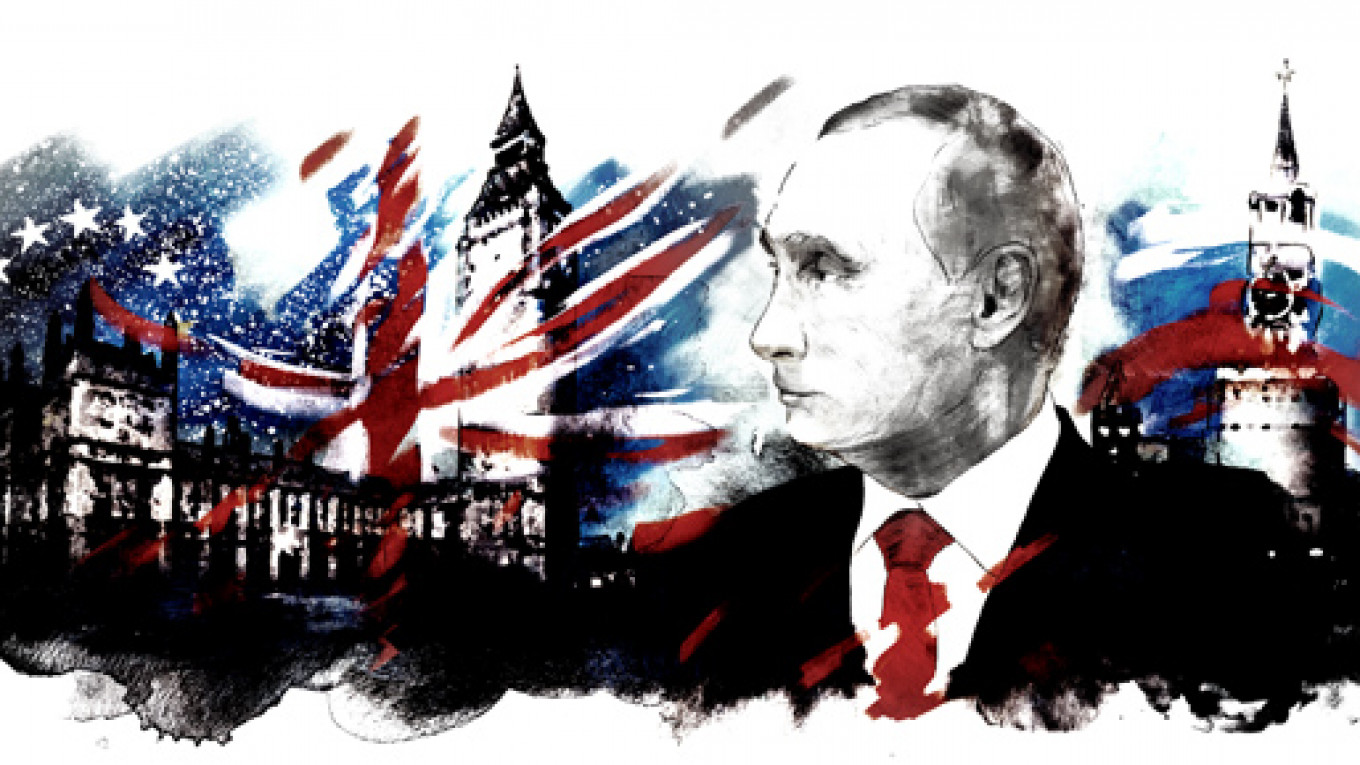
Ben Judah
This Op-Ed was originally published on June 16.
The results obtained by British political polling companies are not normally of interest to the great and the good of Washington, Brussels and Moscow. Yet, this week they most certainly are. These polls sampling thousands of unremarkable Brits are showing a slight, but increasingly persuasive, lead for the Leave option in the country's referendum on its membership of the European Union.
This is causing deep alarm within Western governments.
None are anything but hostile toward Brexit, the neat catchphrase by which the U.K.'s complex and highly painful divorce from the bloc has come to be known.
In Moscow, however, the contrary is true, with the prospect of Brexit presenting many excellent opportunities for Russian officials, oligarchs and, of course, the Russian president.
Property is Russia's first Brexit opportunity. The British pound is already falling, and is expected to fall by one-third if Brexit occurs. This will dramatically improve the purchasing power of Russian wealth in London: from mansions and flats, to legal services and luxury goods. This should be a welcome financial break after the ruble crisis.
Opacity is Russia's second Brexit opportunity. The main risk to Russian investments in London in recent years has been a clamoring for full disclosures of Russian investors, with the aim of stamping out money laundering and stopping British legal and financial services being used by Russian officials who engage in corruption.
The threat to the Russian political elite's quality of life over the last few years has been this — that successful reform in Britain could result in tougher standards throughout the whole of the EU. With Brexit, the risk of Russian officials no longer being able to anonymously buy houses, open bank accounts or send their children to school across Western Europe would be over.
Opacity would essentially replace the campaign for financial transparency. Right-wing politicians and campaigners pushing for Brexit intend to rid London of the EU's regulatory burden. By default, the U.K. would no longer have to apply the anti-money laundering standard, and the gap between it and the remainder of the EU would grow. The regulatory chaos, indeed mess, of renegotiating the trade relationship between Britain and the EU would suck up all regulatory energies for at least a decade — ensuring that transparency projects be abandoned.
Brexit would not be simply an event. It would also bring a very right-wing, very free-market faction of the Conservative Party to power for some time. This is why the U.K.'s opposition, the Labour Party, is referring to it as a "Tory Brexit." Again, for Russian elites, this would be a fortuitous turn in policy. It would mean Russian investors could expect transparency projects to be abandoned, scrapped or unenforced once Brussels regulations cease.
The British political class would be Russia's third Brexit opportunity. Cheaper, opaque and less influential, the U.K. following Brexit would be a U.K. perfectly suited to Russian interests. It would be both weaker and friendlier.
Weaker because, post-Brexit, the U.K. would most likely cease to be an integral state within five years. Scotland, a strongly pro-Brussels constituent nation of the U.K., which only narrowly voted to remain in the U.K. in 2014, will almost certainly secede.
EU membership was also a decisive plank of the 1999 Northern Ireland peace agreement, and it may well be that low-level skirmishes, if not outright inter-communal violence would return to the province. This highly probable sequence of events would effectively end the international role of a power historically deeply hostile to Russian influence.
A weaker U.K. would also be friendlier in several ways. The Brexit process would likely be so complex and potentially economically painful that British politicians would cease their hostilities toward Russian activities worldwide. Boris Johnson, the U.K.'s most likely post-Brexit prime minister, has repeatedly called for the West to cease its counter-Russian activities in Syria and support the Russian president's strategy.
Boris Johnson should be understood by the Russian elite, not so much as a politician without a Cold War mentality, but as a politician without a foreign policy mentality. His tenure as London mayor was marked by intense openness and friendliness to global wealth and investment without political, religious, or ideological prejudice. Russian elites could expect Johnson — whose stated ambition following Brexit is for the U.K. to be a light-regulation entrepôt state — to woo Russian oligarch investment and, highly likely, more amicable ties with the Russian president.
Russia's fourth Brexit opportunity would be inside the EU, but only in the short term.
The initial shock would be there. Thrown into turmoil, Brussels and Berlin would no longer be able to enforce the consensus on Russia-focused sanctions. They would have to be dropped in order to create and reward allies for the far trickier negotiations (and likely punitive trade moves) between the U.K. and the bloc.
But unlike in the U.K., where the opportunities and the removal of a rival would be permanent, Russia should not raise its hopes regarding the prospects of long-term European disintegration. Brexit is not likely to play a role akin to one the Baltic states played in 1990 vis-a-vis the Soviet Union. Instead, Germany and France would take dramatic measures to further integrate the bloc into a political union.
This might include decisive steps to a common foreign policy, which would greatly reduce Russian influence in the EU. The U.K. would no longer be able to stop French, Polish and Baltic desires for a credible, single European army and military command. This, obviously, is not in Russia's interests as it would lessen opportunities for infiltration in states of the former Warsaw Pact.
Nor would a dramatic upswing in opportunities present itself in Ukraine. The sense of historical emergency, and ensuing media storm, would likely instead see the United States reengage in Europe to stop further disintegration or too obvious Russian opportunities from emerging.
Such risks of continental hyper-consolidation aside, the unexpected late swing away from Europe has clearly come as a pleasant surprise not only to Brexit supporters, who a decade ago were a crankish minority in British politics.
It will also, surely, comfort the Russian president.
Ben Judah is author of This Is London and Fragile Empire.
A Message from The Moscow Times:
Dear readers,
We are facing unprecedented challenges. Russia's Prosecutor General's Office has designated The Moscow Times as an "undesirable" organization, criminalizing our work and putting our staff at risk of prosecution. This follows our earlier unjust labeling as a "foreign agent."
These actions are direct attempts to silence independent journalism in Russia. The authorities claim our work "discredits the decisions of the Russian leadership." We see things differently: we strive to provide accurate, unbiased reporting on Russia.
We, the journalists of The Moscow Times, refuse to be silenced. But to continue our work, we need your help.
Your support, no matter how small, makes a world of difference. If you can, please support us monthly starting from just $2. It's quick to set up, and every contribution makes a significant impact.
By supporting The Moscow Times, you're defending open, independent journalism in the face of repression. Thank you for standing with us.
Remind me later.






